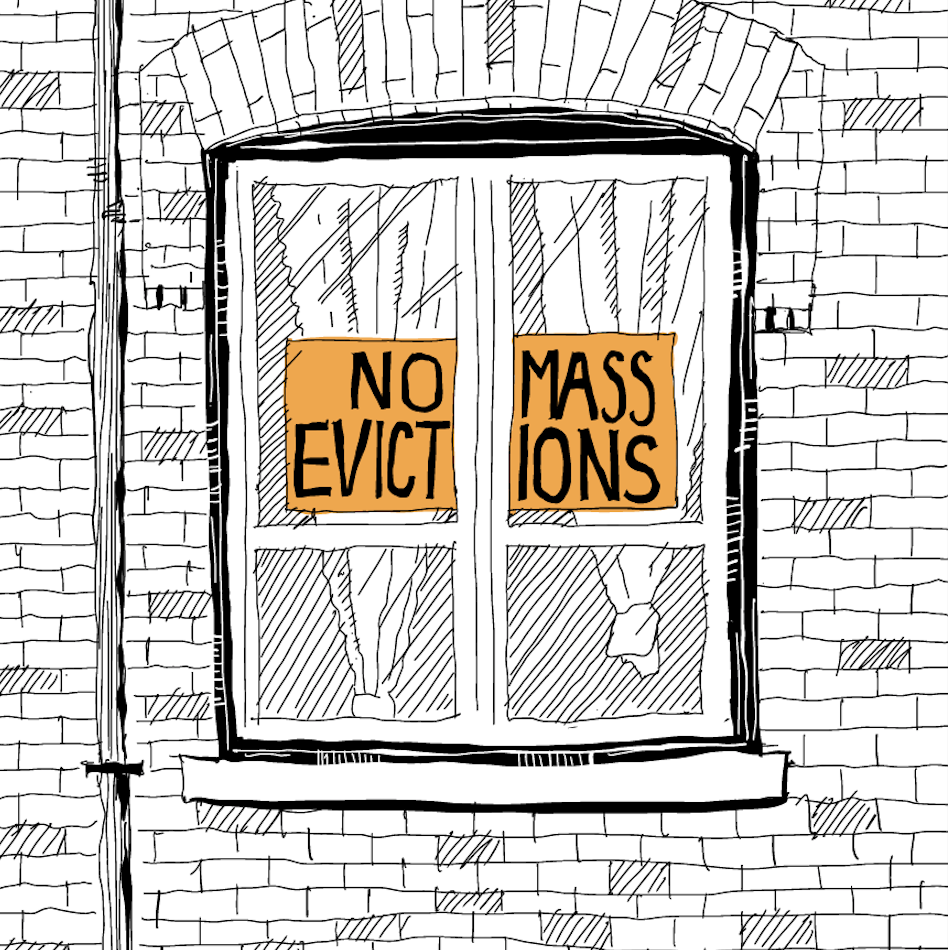Lauren Roulston • Jul 17, 2024
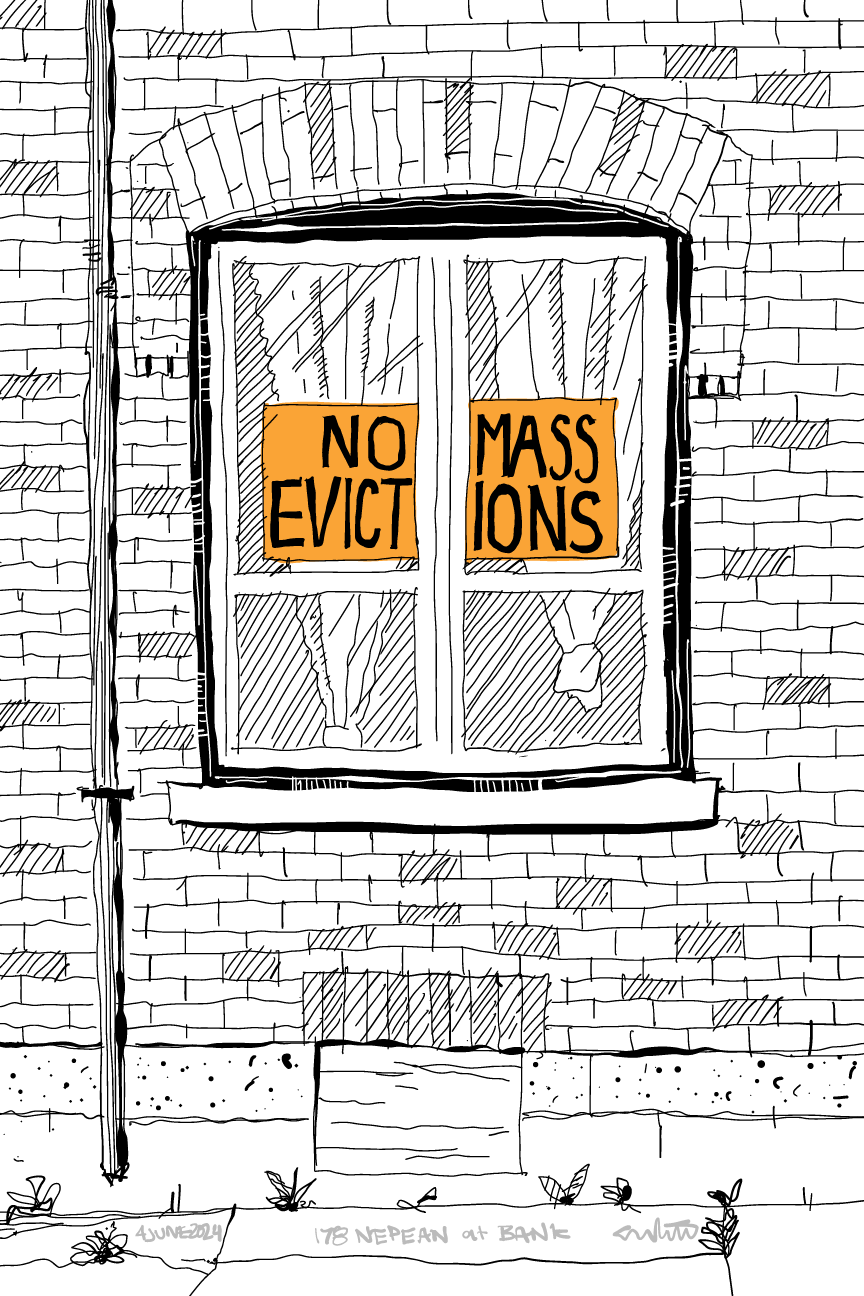
Artwork for the Bank Block Tenants, courtesy of Colin White (www.ColinWhite.ca)
Despite being asked to do so by their building’s owners, the Bank Block Tenants aren’t leaving. They’re organizing against recent eviction notices issued for redevelopment plans and intensification, commonly referred to as demovictions.
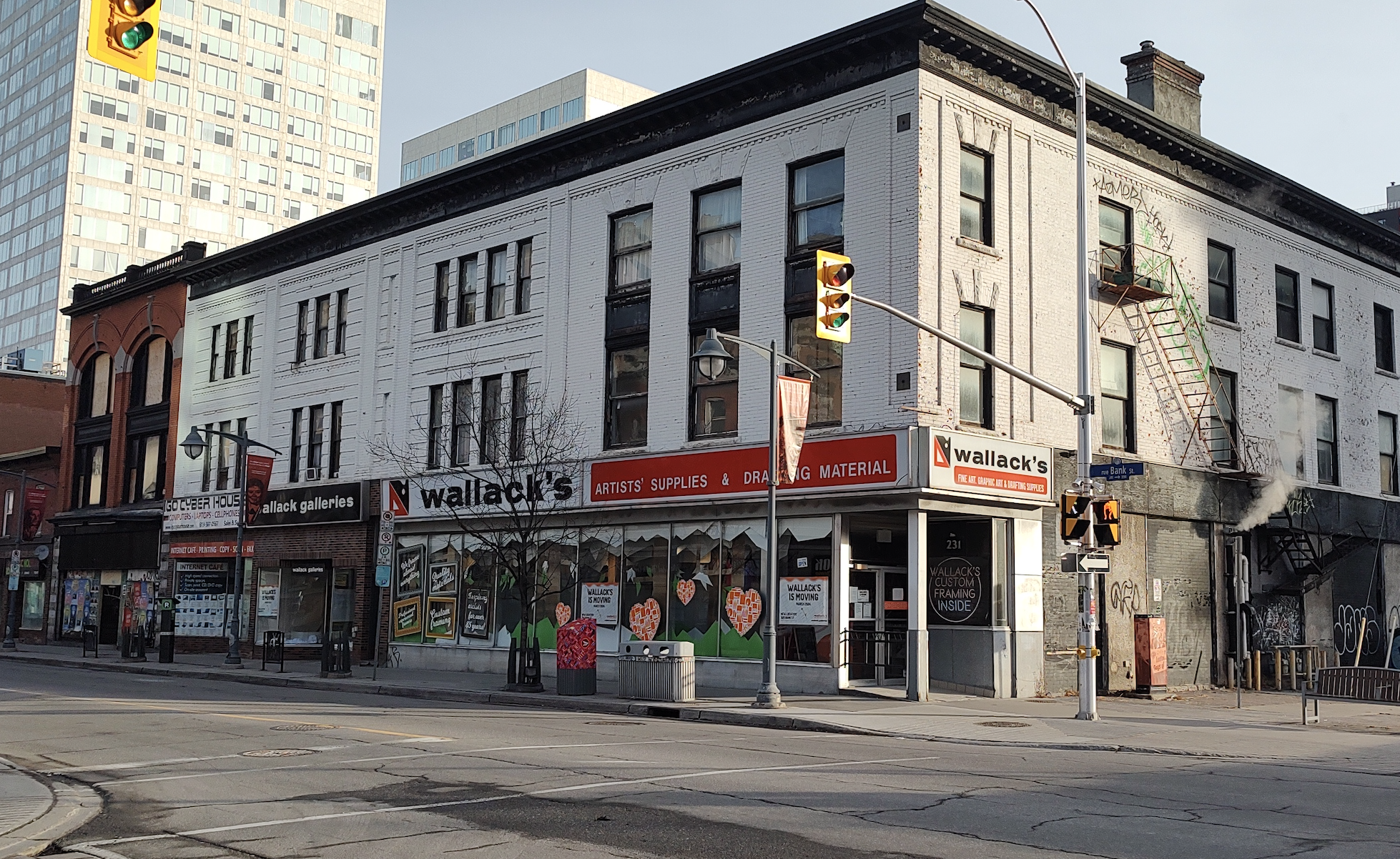
(Photo courtesy of Julie Ivanoff)
The Bank St. buildings between Nepean St. and Lisgar St. has been home to many of these tenants through the years, providing relatively low-costs in rent. For many, the eviction orders threaten their access to housing especially as Ottawa’s housing crisis goes on.
Julie Ivanoff is one of the tenants organizing against the demoviction orders. They’ve been spreading awareness through the Bank Block Tenants website and engaging with the community. CHUO was able to reach Ivanoff for an interview over Zoom to discuss the Bank Block Tenants’ organizing efforts, here’s that conversation:
LAUREN ROULSTON: For a brief intro, 211-231 Bank Street Holdings is the owner of the downtown Ottawa block that we’re going to be talking about today. It’s a strip on Bank St. between Nepean St. and Lisgar St. Smart Living Properties (SLP) is the company’s development manager, and they’ve redevelopment plans that include a nine-storey tower that the city has yet to approve of, as far as I’m concerned.
Before they begin with any demolitions a mass eviction is central to the project which is leaving so many tenants vulnerable to displacement and homelessness. So, as one of the Bank Block Tenants, can you tell me about how this has affected you?
JULIE IVANOFF: Well it’s been hard on everyone because this has been ongoing for over a year. So as we’ve been organizing and resisting this demoviction and also having to research and understand our rights as tenants and which processes are involved, whether they come from the city or the Landlord and Tenant Board (LTB) and also what power the actual landlord has.
That’s been exhausting and challenging for us to navigate because it’s difficult to get that information and it’s difficult to get clear help and understanding. I mean, the best help that we’ve had is from other tenants who’ve gone through this process, when we’ve been lucky enough to connect with them and other people who’ve also organized.
But it’s been stressful for everyone. Especially since the property managers have been – how to describe it – they’ve been bullying us. And they’ve been going above and beyond what I think is ethical or even just considerable ways to treat people, especially when we’re talking about vulnerable people and taking full advantage of them.
So it’s been really tough to just go home after organizing. Or every time that you’re home thinking, ‘well, do I need to pack up and leave?’ every time you hear the door knock. ‘Who’s at my door? What are they going to say to me, what are they going to tell me I can or cannot do,’ and I don’t know how long I can be here, and that’s stress.
And also even talking to our neighbours, that stress is really hard to manage.
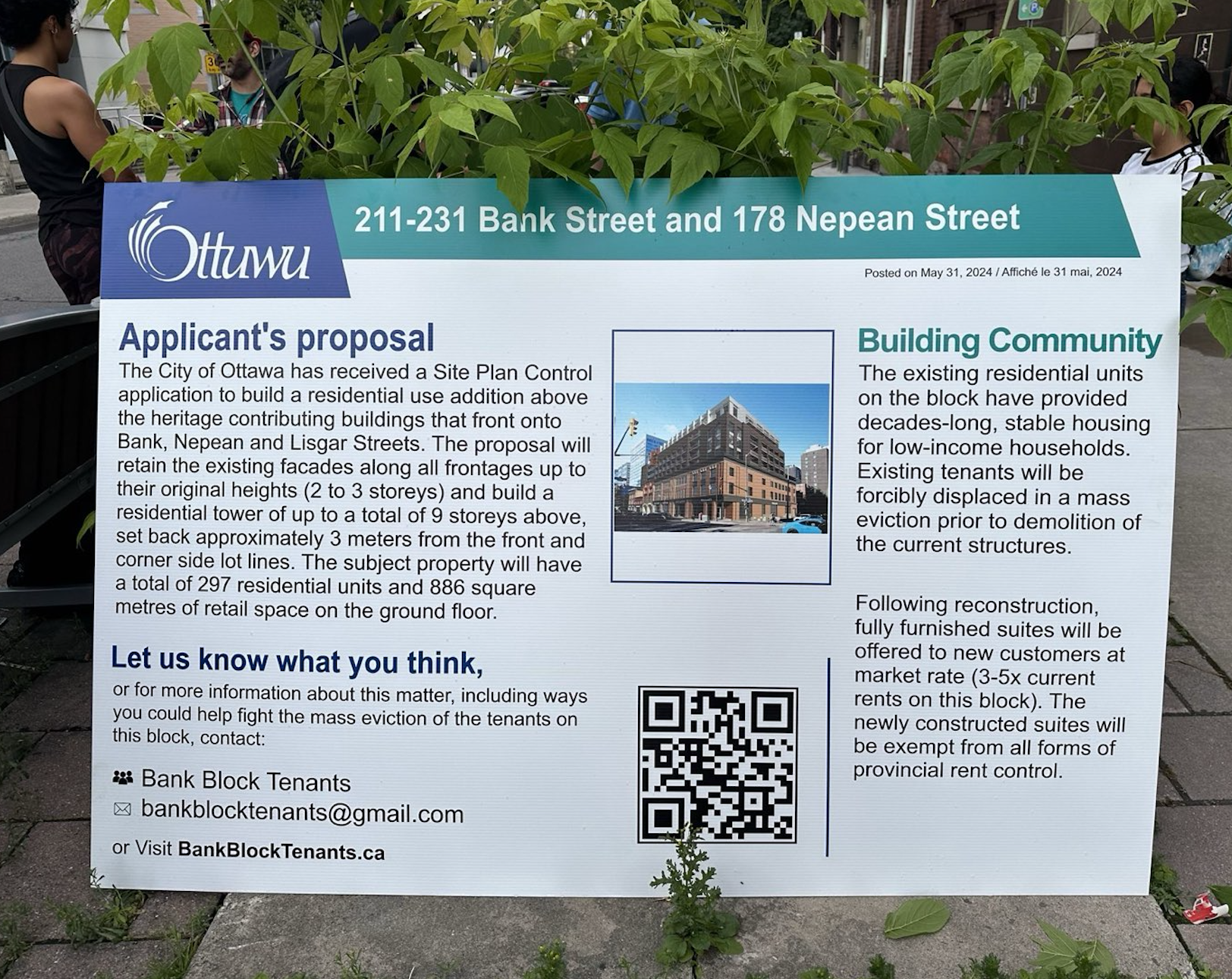
(Photo courtesy of Julie Ivanoff)
LR: Wow, I want to pick up on the property manager’s response and the bullying that you said of in a second, but as far as the unity within the tenants coming together to figure out a plan forward, I kind of want to touch on that first. There’s a lot of tenants who have refused to leave after the landlord has issued this eviction notice, and I kind of want to check in, how many tenants are actually still there right now?
JI: There’s around 20 tenants.
LR: Yourself included?
JI: Yep, absolutely. And that’s between both buildings. So there’s two residential buildings on this block and the rest of them are commercial. Those unfortunately have already been evicted, excepting one commercial unit.
LR: So like you said, big stress factors. What were the Bank St. Block Tenants like, demographically speaking?
JI: Oh, it’s diverse. Completely across the board. I mean, we’ve got all age groups from students to seniors. Oh gosh, all races, genders, varying disabilities and accessabilities.
It’s – yeah, I don’t think there’s anything we have in common besides being people trying to keep our homes.
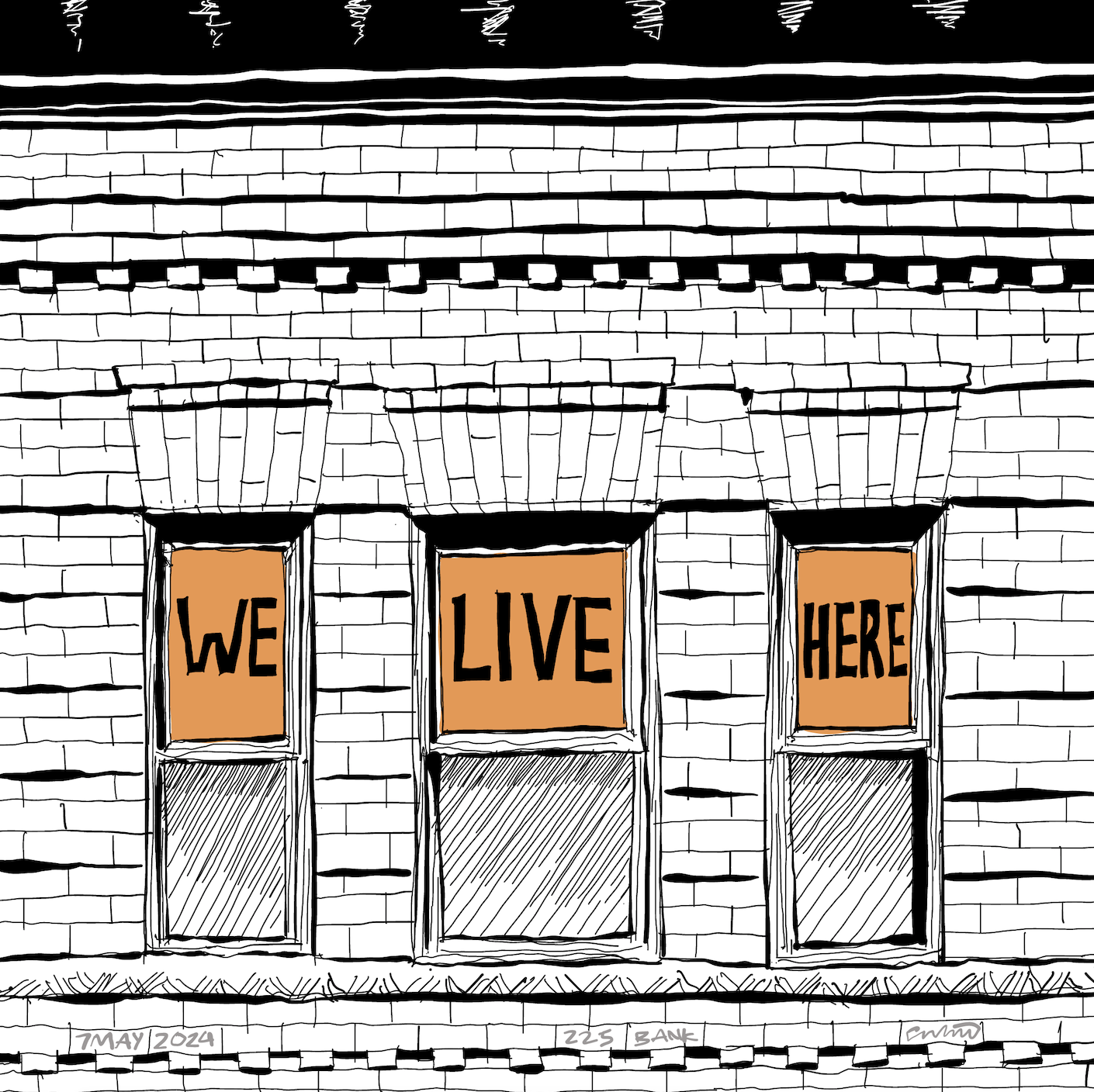
Artwork for the Bank Block Tenants, (courtesy of Colin White/www.ColinWhite.ca)
LR: Of course, and that’s like the goal at the end of the day – I guess if I could kind of like, get you to explain the goal of this organizing and this resistance right now.
JI: Well the goal is to keep our homes. It doesn’t make any sense that in this supposed housing crisis that mass eviction is critical to contributing or adding more homes, like it just doesn’t make any sense, they have to make sure that people can’t live here anymore in order to meet that demand, yet homelessness is part of that plan? I just think that it’s outrageous.
So we’re just trying to keep our homes. Especially, you know, since some of us have lived here for several decades.
LR: Yeah, yeah, since like the 80s or 90s is what I read. I remember reading on the Bank Block Tenants website that if the new development plans were to open up their doors and keep the current tenants it would only take up about 5% of the units.
What does that signal to you that the property owners haven’t moved forward with that plan of action?
JI: Well, it just demonstrates that there’s no interest in actually providing housing. This is temporary accommodation they’re looking to build. This isn’t home, this isn’t community building for the city, it’s not trying to maintain the people who’ve already contributed to this community or keep them here.
It’s not looking out for basic rights, it’s all about profit and that’s so disheartening. It’s so disheartening that there aren’t any regulations that are protecting the rights of existing tenants or allowing people to rent and have houses.
Even the word, just to speak about ‘permission’ to keep our homes, it’s just outrageous that we even need to consider this. Like, home ownership and having an income or lifestyle that can maintain that is the only way that you get a place to live is so disappointing for the capital of Canada.
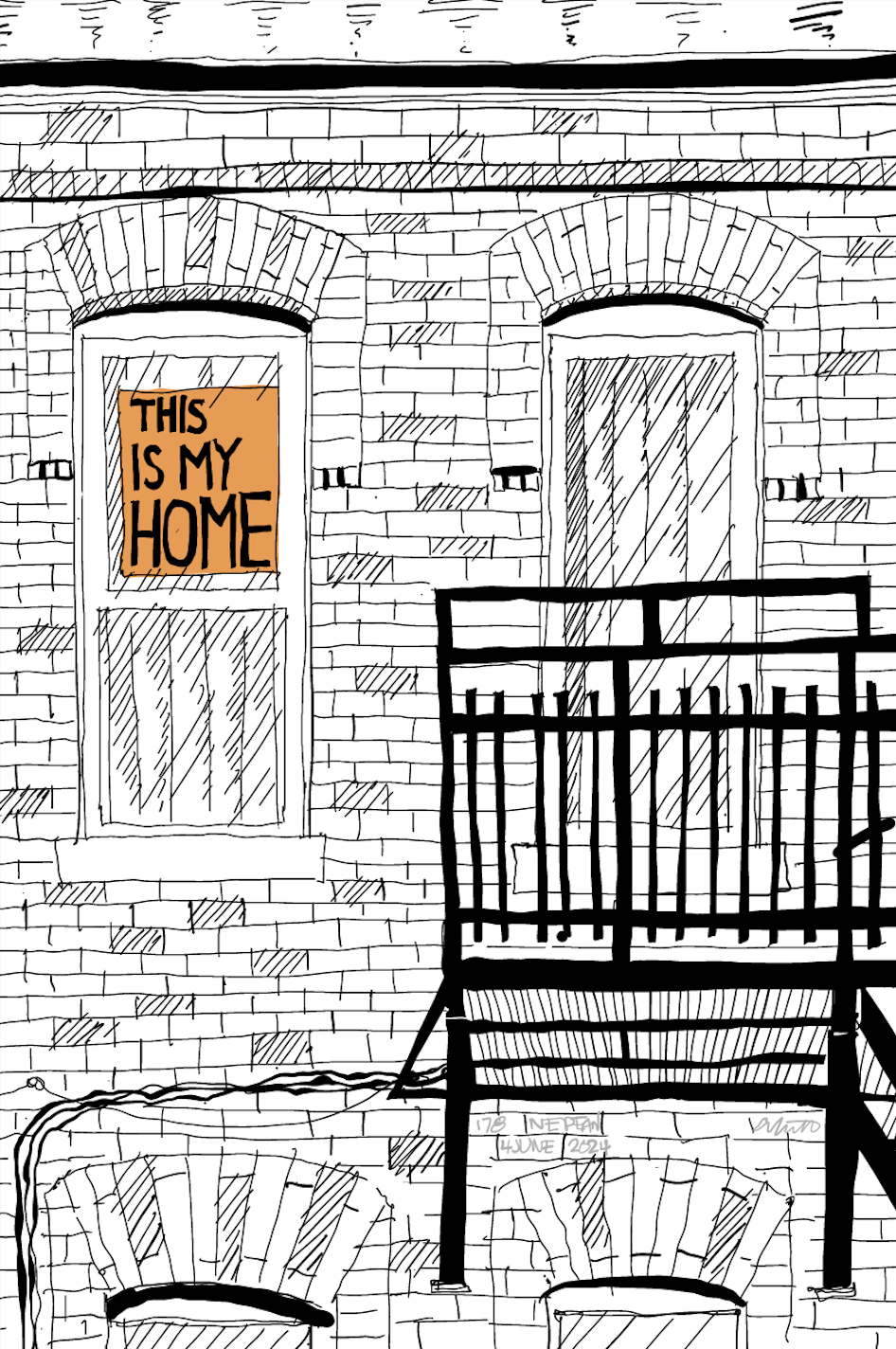
Artwork for the Bank Block Tenants, (courtesy of Colin White/www.ColinWhite.ca)
LR: As required of a lot of renovictions and demovictions, the owners have had to give out relocation money, which from what I’ve read tenants are saying this is not enough. Can you walk me through why this is falling short, especially in today’s housing market?
JI: Well, it’s about what actually helps us versus following the rules that are already in place. So Smart Living has talked about giving us up to one year’s rent. That’s what it says on the contract that they gave us. They’ve offered us three months.
Now if you’re paying $500, for three months that doesn’t give you rent for one month in a one-bedroom at the current circumstances, which is just insane.
If we go and look at the properties they have available for rent, it doesn’t help us rent from them. So they’re not contributing to affordable or accessible housing and that goes against everything they claim to be standing for, or that the city says they’re supporting.
LR: And I guess, to pull it back on that point to the communications that you guys have had with the development managers, can you tell me about what that has been like?
JI: Well, we’re on our second property manager. It’s been so difficult to talk to them. They refuse to talk to us as a group, they refuse to communicate to us in any way besides knocking on doors and dropping off threats using N13s or L2s.
If it isn’t a threat for eviction, they’re just not communicating with us. Our current property manager, Andrew Amin, he’s actively said ‘no, I’m not talking to you.’ He runs away from us, he refuses to speak to me in our buildings and it’s brutal. It’s just tough that they come in barking orders and then leave.
LR: How does that feel for your like, day-to-day? This is your home and you’re having to put up with those circumstances, how does that feel for you and the rest of the tenants?
JI: Well, it’s stressful, nobody likes it. But at the same time it’s just kind of ridiculous. It’s not professional, so it doesn’t give me any reason to respect the company or believe in anything they say. There’s no way that I can actually support any of the regulations in place and respect those either because if they’re going to be playing dirty I’m like, ‘am I back in kindergarten?’ Like, what are we going to do here?
It’s kind of silly and it’s been pretty amazing to see the help of a lot of our friends, community members who have been supporters who’ve become our friends who are here to say, ‘hey, this is nonsense, nobody should have to deal with this, and we want to give you a hand because not everybody is not able to protect themselves or stand up to it.
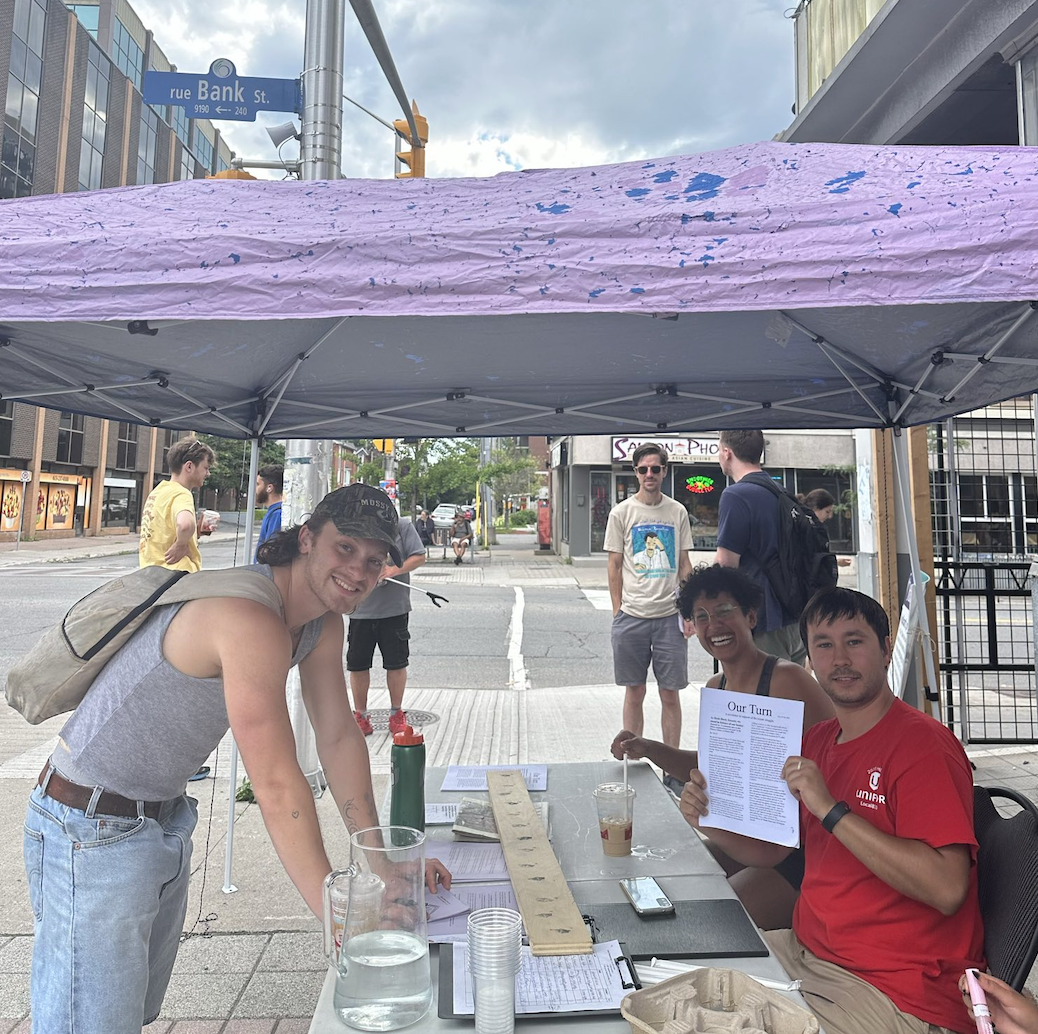
(Photo courtesy of Julie Ivanoff, pictured second from the right)
LR: And like you said, $500 times three months rent doesn’t begin to cover it. I was reading that in January a report on the average one-bedroom apartment in Ottawa is around $2,000. So that’s leaving a lot of people at risk of not having a home, which is terrifying given that the city is facing a housing and homelessness crisis.
Demovictions, renovictions – a big part of that. So in this case of intensification, what do these current attitudes that you’re getting from the development management, Smart Living Properties, what do these attitudes tell you about how they feel about tenants rights?
JI: It’s not about people, it’s only about profit. That’s very clear in every way, like you said their initial proposal 297 units now it’s gone down to 263 yet 263 units and there’s about 20 of us, none of those 263 are accessible. What sense does that make?
I mean, yes housing is really important, yes we absolutely need housing in this city but what types of sacrifices need to be made for that, and why aren’t they financial? Instead it’s going to be people? What are the ethics behind that?
I just – I don’t understand how the city is helping with that – if you want to talk about provincial politics like, how are they actually protecting people or helping people in any way?
LR: I guess, is it plausible to hope that the city council disapproves any plans going forward with this development?
JI: That would be really nice, admittedly I have no way of knowing what to think about that. I mean, I know that we have support from our councillor, but that’s only one person out of how many, so we’ll have to wait and see.
LR: So what’s the general attitude right now within the 20 of you that are still there? I know you mentioned the stress, of course, but what has the planning and unification looked like?
JI: It’s really great to get to know our neighbours and I just love seeing them in my everyday encounter, and it’s nice to have something to like, a baseline that we can connect on even though it’s not the nicest.
But it’s nice to have these friends and say, you know, ‘hey, how’s it going? How are you doing?’ and also seeing people saying, ‘yeah we’re in this, we’re holding on and we’re all together,’ and that support and solidarity that is now, in my opinion unquestionable, that is so special and it helps me find the confidence because all of the work that we’ve been doing to organize but also, all of the help that we’ve had from the community is really empowering and it’s nice to see that, you know, despite our stress all that help really does give us a positive outlook and really is energizing.
LR: That’s amazing, that show of unity in really tough circumstances. I think you said it’s been like a year of going through this together, so it’s great to do that, like I said together. What was that initial moment like when you guys first found out about the redevelopment plans?
JI: Oh that was unbelievable because I think I found out an hour or two before the actual presentation to the city. The only reason I found out is because there was an email sent out from one of my neighbours about a posting saying, ‘hey, did you know there’s this public consultation happening.’
And again, if I didn’t happen to check my email, if I was unavailable, I would have missed it. And then to see that this whole proposal has already been evaluated, also hearing that there’s absolutely no consideration for what exists here before. I mean we’re in a heritage area. Places like Wallack’s are staples, I mean they’re staples to me and the artists that work here.
There’s nothing that involves art studios or arts in addition to the people who still live here. There’s nothing involving how this is going to contribute to community, I mean especially when it comes to things like finding out that the majority of units are going to be furnished bachelor apartments.
How is this actually contributing to any type of diversity that I think is familiar and pivotal to Centretown? I like being here because I know there’s a place for everyone. But no, there’s only a place for people who don’t have furniture, don’t have identities, don’t have unique things about them, and don’t have partners, dogs, cats, family members or friends to visit? Nope.
This is – it feels like a jail cell, and I thought ‘ok, this is what happens in a housing crisis.’
LR: The housing crisis is – to pull it back to the current state in Ottawa – to get on to a subsidized housing list that might take over five years, there’s about 12,000 on the list right now.
So without that regard for the current tenants – I guess another instance that I saw was that out of the over 2,400 pages for the development planning that the SLP submitted, the current tenants weren’t mentioned once. So is that something that the management developers have been able to address with you, or has it just been brick-wall ignoring?
JI: Oh, absolutely ignoring. There’s no communication between what their proposed development changes are and us, except for ‘get out and do this quickly and we will make your lives really stressful if you refuse.’
LR: So you guys have really had to put in the work to figure this out yourself to unite and say, ‘no we’re not going to give up our homes,’ right?
JI: Exactly, and I guess one of the more radical things that we’ve been doing is actually talking to our neighbours about this, and it’s a double-edged sword. It’s nice to know that you’re not alone but it’s so disheartening to hear about how many people who’ve already been through this process and didn’t know what their rights are and didn’t have a choice and lost their homes and so now they’re in new ones or they’re in threats of renoviction or they’re in the same process as us.
That’s unbelievable that there are so many within a couple blocks of Bank Block.
LR: And for anyone who might be listening who could be in a similar circumstance, could you walk us through what some of those rights are that you do have as tenants that you can hold close?
JI: Okay, well it really depends on what they’re being served with, but one of the things that I learned that I had no idea, is that the Landlord and Tenant Board is the only organization that can remove you from your home.
So if there’s threats saying that the landlord says ‘no, you have to be out by a month,’ that’s a lie. You have to go through a hearing process. They need to prove that there’s reason to evict you. I mean, of course historically, the Landlord and Tenant Board has sided with the landlord.
I don’t know if that’s in the process of changing, I’d like to hope that it is. But until you go through that process, nobody can kick you out. That’s just a flat out lie.
Once you get your N13, that’s saying, ‘hey we need you to leave.’ So for us that’s, ‘we need you to leave because we’re going to be demolishing that building.’ That’s a four-month process and you have to wait for that to be complete before they can go to the Landlord and Tenant Board, Landlord and Tenant Board will give you an L2, that means you’re going to be going through a hearing.
But when that happens, I have no idea. Sometimes I’ve heard that the wait time is seven to nine months. I’ve heard nine months to a year, I’ve heard well over a year, I’ve heard multiple things depending on what time of the day I’ve been calling.
But everybody has to go through that process before they can evict you.
LR: Was this something that you were aware of before going through this yourself?
JI: Absolutely not. I have never been evicted, I have been renting for most of my 20 years in Ottawa and this has never come up so I had no idea what to do.
LR: Okay, and so if anyone wants to support the Bank Block Tenants and these efforts and your ongoing organizing, how could the community get involved?
JI: There’s multiple ways. They could go to our website, bankblocktenants.ca. There, there’s a link to the city portal so they can have a look at the proposal that’s going up on the block and it’s still open for comments since it hasn’t been approved.
So if you want to read through the documents or not, but you’re in support of tenants having rights or accessible housing or opposing eviction for more housing, you can write that in and tell that to the city and let them know.
We took out a request for information back in February, and there were around 100 comments then, so there are a lot of people who are outspoken about this, because it’s not just about Bank Block, this is just one example of the many new developments and I think that anybody who’s renting is at threat.
So if you go to our website, or you can also email bankblocktenants@gmail.com and you’ll get in touch with myself and my neighbours.
LR: And then, are there any advancements coming up that people should keep their eye out for?
JI: We actually meet outside at Bank and Lisgar at 3 p.m. on Saturdays, so you can come and talk to us, talk to the people who volunteer with us, and if there’s anybody who’s going through the same process or wants to support us or help, or have questions or just talk and share, come and meet us there.
We’ve been out there for a couple of months now and we’re going to keep doing that just to bring awareness in case there are other people who are going through this just so that way they can be educated, because I think that again, this threatens everybody or anybody who’s renting who isn’t paying exorbitant amounts of rent.
LR: Those were all the questions that I had for you today actually, but is there anything else that you would like to add?
JI: I guess the only thing I want to say is if you’re shy or nervous about confronting these large landlords or the city about these things, I understand that that can be scary but voices count and they do move things. So as difficult and as challenging as that can be, I’ve learned through this process that it does help, it does matter, and if we can organize that’s when we have the greatest power and there are a lot more of us than there are landlords and we’re also voters so we matter, so not to be shy.
And if you need some encouragement, again, come out on Saturdays and I’ll help pump you up and we’ve got a whole team of people who can show you how this has actually helped and coming together and fighting this does make a difference.
LR: Well that feels like a great point to end on, thank you for making the time to speak with me today.
JI: Thank you so much.

